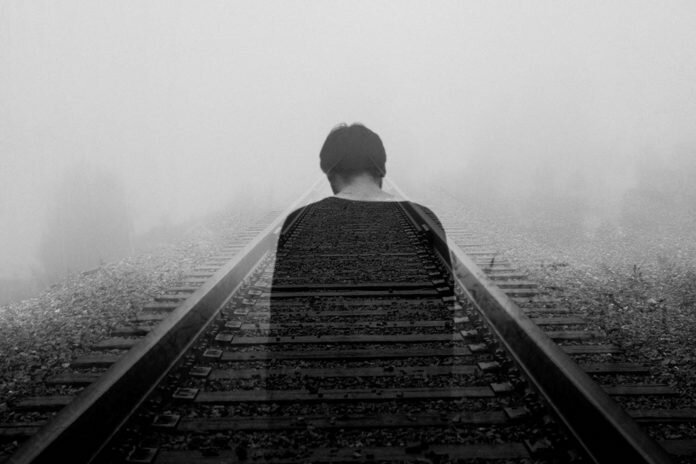Come to my house,” Xander said. It was 40 minutes outside our town. He wanted to take us to his home, meet up with his friends, introduce us to his family. We were a tight clique of four—two boys, two girls—and he was breaking in. We conferred before telling him yes. I never asked my parents. I knew I wasn’t supposed to be there. But Xander was a good-looking guy, and the other girl in our group said she maybe had a crush on him. He was tall, soft-spoken, a wrestler or a baseball player, lean, with pleading eyes. I knew that look. It spoke of hurts carefully packed. It was as familiar as a curl around my finger. He was like me. We voted to try him on.
Xander drove ahead of us, wild on the road. I was glad to be in a separate car on this forbidden trip and with my forbidden boyfriend. Xander was off. Way off. When we arrived and disembarked from our mini caravan, he was rambling high and low about where he came from. Bouncing and shaking because he was vulnerable, his smile too wide to be real. We were high schoolers, all of us reckless in our self-expression, but Xander emanated fragility. I had the distinct impression he was going to break himself.
His house was ramshackle and smoke-filled. The patio door creaked open and slammed behind us. Xander’s mom stood in the hallway, a heavy, angry woman dressed in shorts and a stained T-shirt. When Xander walked in she looked him up and down and said, “What are you doing here?”
Xander was hard to focus on. He was vibrating, frantic. “I brought my friends.”
Maybe the girl who hurt him was in his house. Maybe that’s what pushed him over the edge. There was a clump of teenagers in his living room, all of them with lit cigarettes. He looked them over and trembled. One leggy girl was sitting off to the side. Her smile filmed her face like oil on water. For a moment, I was repulsed. She looked away from me, the turn of her head a rebuke. I wasn’t even on her radar.
Maybe Xander asked what the girl was doing there. I can’t remember every detail. The room was dark. The TV droned and flashed. Xander paced a three-step stretch.
His mother shrugged. “You have to leave,” she said. “You can’t bring them here.”
She glared at us, all glossed and pressed. I know what it looked like. We were from money, from the northern money town, all of us pinned up in awards and accolades. All of us would be admitted to excellent universities on merit-based scholarships. We were high class, the way she looked at us. I could almost hear how much she hated us.
“Can I at least offer them a glass of water?” Xander asked. His feet were flat on the ground. His shoulders were shifted forward, and he raised them like he could dislodge a boulder.
She shrugged, and when he started toward the kitchen she stomped off and slammed a door, cursing us for being spoiled and rich. Her cigarette left ash streaked on the linoleum.
Xander came back with a single glass cup filled to the brim. One of us took it and sipped. “Thank you.”
“Maybe we should go,” I offered.
“Damn it!” Xander shouted.
We all jumped.
“This is my fucking house!” He screamed it down the hall. Then he ran after his mother.
We stepped out onto the porch and waited for the shouting to subside. When Xander rejoined us, he seemed smaller. I touched his wrist and, when he looked at me, I pressed my lips together. His mother was wrong. I was not from money, nor was I used to the concessions of a violence-free life. And I knew that his mother had beaten him while we waited. I knew he could have overpowered her, but he thought he deserved it. I knew he was like me. But that gesture was as far as I dared shift the tether to my pack. He was still under our review.
***
We stacked ourselves neatly back into our cars. He led us out to a deserted strip of pavement and hard, sand-colored dirt. The concrete rise of a bridge grew in front of us. We wondered what we were doing there, but only for a moment, because Xander walked around his Jeep to the trunk and pulled out a six-pack of beer.
I tensed up. Alcohol was the subject of many lectures from my father on my certain damnation. Alcohol and boys paved the way to Satan’s doorstep. Still, in a fit of peer-encouraged rebellion, I tipped an open can and wet my lips, curious. I was not instantly transported to hellfire, as I’d been told would happen, but I also didn’t like it. It tasted of sulfur.
Xander drained a can. We watched, none of us having ever seen anything like the purpose with which he went about this business. He drained another. He sat in the driver’s seat. One of the boys pulled the keys from the Jeep ignition. “I’ll hold on to these.”
For a long time, Xander laid his head on the steering wheel. His brown hair fell forward. His face was invisible and his breathing even and slow. We thought he was asleep until he began to talk. He whispered to us about another place like the one where we parked. He painted a picture of train tracks and green grass and the promise of childhood.
“I used to play there.” With his best friend, he would line up rocks on the tracks and wait for the trains to pass. “It was a competition to see whose rock would shoot off the farthest.” Then the girl came along. She was bigger, older, but not by much.
“She used to make us lay down on the tracks and have sex with her.”
Xander began to cry.
“She used to force us!” he shouted. I saw him as the child he described: on his back at the top of a green slope, his head on the train tracks and his pants around his ankles. His friend beside him in the same arrangement. And what if the train had come? Fear was the stimulus for his body’s betrayal. He slammed his hand on the steering wheel. “We didn’t want to, but we couldn’t say no.”
At first, we gaped at one another. Then we were afraid to share eye contact. Xander sobbed noisily as he confessed. How many beers had he drunk? There was one left in the six-pack, one in someone’s hands, and four in Xander’s stomach.
“Why didn’t she love me?” I don’t know how much time had passed. Maybe an hour. Xander was fading.
When he calmed, we convinced him into his back seat. I went back to my boyfriend’s car. The oth-er two drove Xander the 40 minutes back to our town in his Jeep.
I asked my boyfriend what we should do. We had no answers. Speaking up would reveal where I had been and with whom. I would be laying myself on the sword, and after years of cloistered life with abusive parents, I was unwilling to sacrifice myself. I was selfish with a fear that ate at me from two directions. Silence is a tricky beast.
***
Someone said, “He was drunk. He probably made it all up.” Does it matter who? As an adult I recognize the oppression bottled up in that statement. Voicing it was unfair. I knew Xander had told his truth. I knew he did. But we four teenagers thought with a hive-like mind, afraid to disagree because it revealed the soft underbelly, left us open to attack, demonstrated weakness. As quickly as Xander had drunk those beers, that’s how fast he was out of our lives. We weren’t ready to help him carry his burden.
We cut him from our lives and never spoke of him again. He was a mess. We didn’t know what to do with him, how to see him without seeing what he had trusted us with. His shape had changed. He didn’t fit. He could not be one of us.
And not only could Xander not be one of us, but neither could we. From that point on, our group began to dissolve. It was a slow descent into independence. Or maybe an ascent. I began to learn about the other girl in our group what I did not wish to know: she truly never believed Xander. She sometimes made vague references I was certain were about him. Pointed assertions that some kids did not belong “out in the general population.” They should be jailed or hospitalized. They were cheats, thieves and liars. She was personally offended by men who cried rape, and doubly offended by women.
I was shaken. I had confided to her a year before all the nasty business of rejecting Xander that my body was violated. I reminded her one day, when the noise of the halls became too much. A peer had bumped into me from behind. I screeched and jumped away, contracting with silent tears.
“What happened?” she asked.
“It just reminded me. . .” I said, but I choked.
“Of what?”
I walked to the side of the hallways, away from the passing crush of bodies. There was an empty doorway, its heavy door shut and its teacher absent, probably monitoring the halls. The words came out in a whisper. I shook, fighting to stay upright. But the world was spinning and I felt 14 all over again, spread out and inhabited and unable to articulate how unwelcome the occupation.
“That’s ridiculous,” she said.
The words bounded around inside my skull.
“I’m going to class.”
She left me in the hall. I stood in the doorway until the second bell rang and there was nothing but blue carpet and the litter of careless teenage passage in the walkways. Whatever my eyes touched had an eerie glow. I pushed my way into the nearest restroom. I slid down the wall and cried into my hands until I was drinking my own tears. I cried until another girl came along with her hall pass. She crouched beside me to coax out words. But I was incapable of coherent speech, so she rushed out and brought a teacher back with her. The slight woman wrote me my own pass and told me to take my time. If I needed her to, she would walk me to a counselor. I wish Xander could have been there to be likewise soothed because, “Sometimes,” she said, “we just need a cry. But sometimes we need someone to hear us.”
Photo by Gabriel / Unsplash













